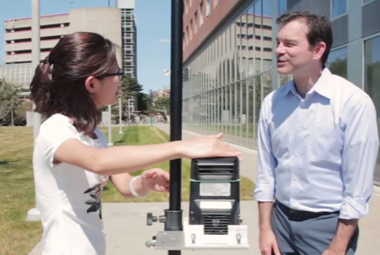
Master of Science in Engineering and Public Policy
Master of Science in Engineering and Public Policy
Overview
Northeastern’s Master of Science, MS, Engineering and Public Policy provides the knowledge and tools needed to extend traditional engineering analysis to be relevant to public policy and decision-making. This program covers the core skills necessary to link engineering design and analysis research with the economic and policy contexts needed for decisions that affect society at large. Students study specific engineering applications, coupled with fundamental methodologies in policy analysis, economics, and statistics.
The need for engineering policy
The coming decades represent a crucial time in human history as environmental change, urbanization, and technological progress profoundly reshape the ways in which we live and work. From the opportunities of renewable energy and artificial intelligence to the threats of climate change and aging infrastructure, engineering professionals with both technical and policy expertise are poised to be the key decision-makers and leaders of the future. Already, public policy expertise is vital for successful planning and completion of civil and environmental engineering projects.
Innovative Curriculum - MS in Engineering and Public Policy
The MS in Engineering and Public Policy degree is a joint program of the Department of Civil and Environmental Engineering and the School of Public Policy and Urban Affairs. The degree is designed for students with an engineering or scientific background who wish to pursue careers relevant to public policy organizations, such as local, state, and federal public agencies, industry organizations, technology assessment and research firms, and engineering and management consulting groups.
- Ability to identify, formulate, and solve complex engineering problems.
- Ability to explain and apply engineering principles.
- An ability to analyze engineering problems using systems modeling techniques and perform quantitative policy analysis of engineering problems and solutions.
Over 15 graduate certificates are available to provide students the opportunity to develop a specialization in an area of their choice. Certificates can be taken in addition to or in combination with a master’s degree, or provide a pathway to a master’s degree in Northeastern’s College of Engineering. Master’s programs can also be combined with a Gordon Engineering Leadership certificate. Students should consult with their faculty advisor regarding these options.
Gordon Institute of Engineering Leadership
Students may complete a Master of Science in Engineering and Public Policy in addition to earning a Graduate Certificate in Engineering Leadership. Students must apply and be admitted to the Gordon Engineering Leadership Program in order to pursue this option. The program requires fulfillment of the 16 semester-hour curriculum required to earn the Graduate Certificate in Engineering Leadership, which includes an industry-based challenge project with multiple mentors.
Experiential Learning
Northeastern combines rigorous academics with experiential learning and research to prepare students for real-world engineering challenges. Northeastern is an R1 research institution, rated among universities with the highest research activity.
The Cooperative Education Program, also known as a “co-op,” is one of the largest and most innovative in the world, and Northeastern is one of only a few that offers a co-op program for graduate students. Through this program, students gain up to eight months of professional experience employed in their field of interest as part of the academic curriculum, giving them a competitive edge upon graduation. The College of Engineering has over 3,000 co-op employer partners globally. Our dedicated team of co-op coordinators prepare students for the co-op experience through resume building, developing interview skills, and guiding professional development. Students in the MS in Engineering and Public Policy program will have the opportunity to undertake a professional experience in a policy-related field.
Program Goals
Issues of climate change, environmental health, resource sustainability, and resilience are some of the most pressing public policy challenges facing today’s engineers. The security of our communities relies on the resilience of our critical infrastructure systems, spanning buildings, transportation, water, or cyber infrastructure. Whether considering a technical career with government environmental agencies such as the EPA or interfacing with policy from within an engineering firm, this degree equips students with a broad range of skills to become engineering policy leaders in both the public and private sectors.
Academic Advising
The Academic Advisors in the Graduate Student Services office can help answer many of your questions and assist with various concerns regarding your program and student record. Use the link below to also determine which questions can be answered by your Faculty Program Advisors and OGS Advisors.
Admissions & Aid
Ready to take the next step? Review degree requirements to see courses needed to complete this degree. Then, explore ways to fund your education. Finally, review “admissions information to see our deadlines and gather the materials you need to Apply.




